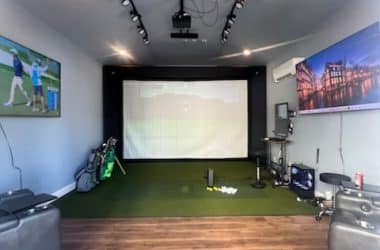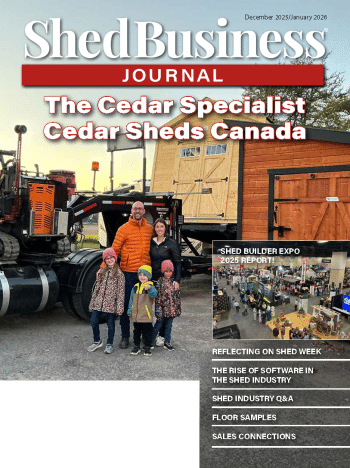Charles Hutchins doesn’t just sell sheds. He gets to know his customers and provides the backyard solutions they want and need.
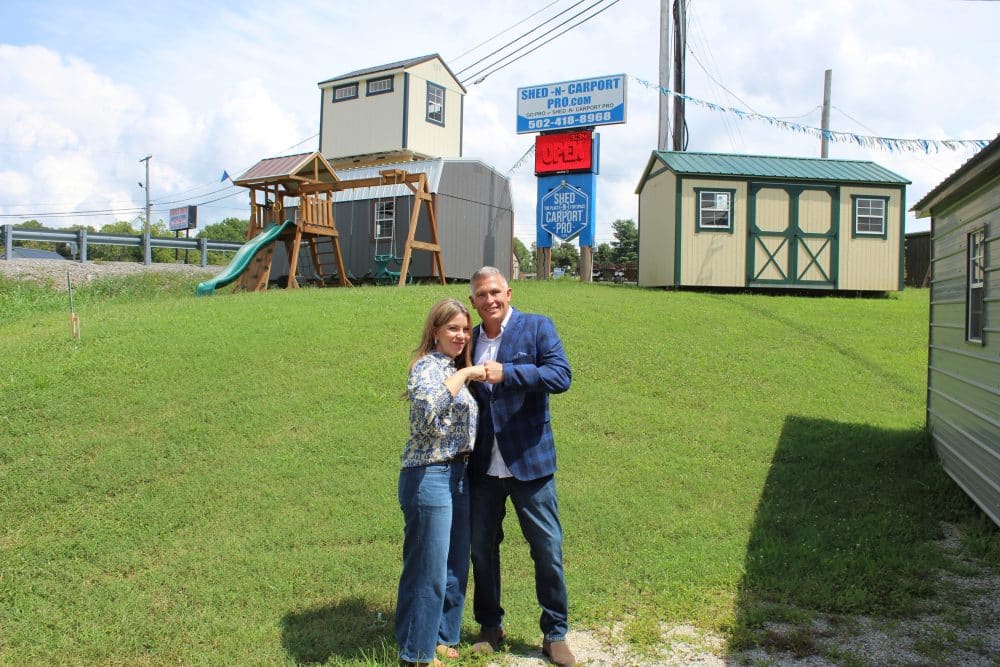
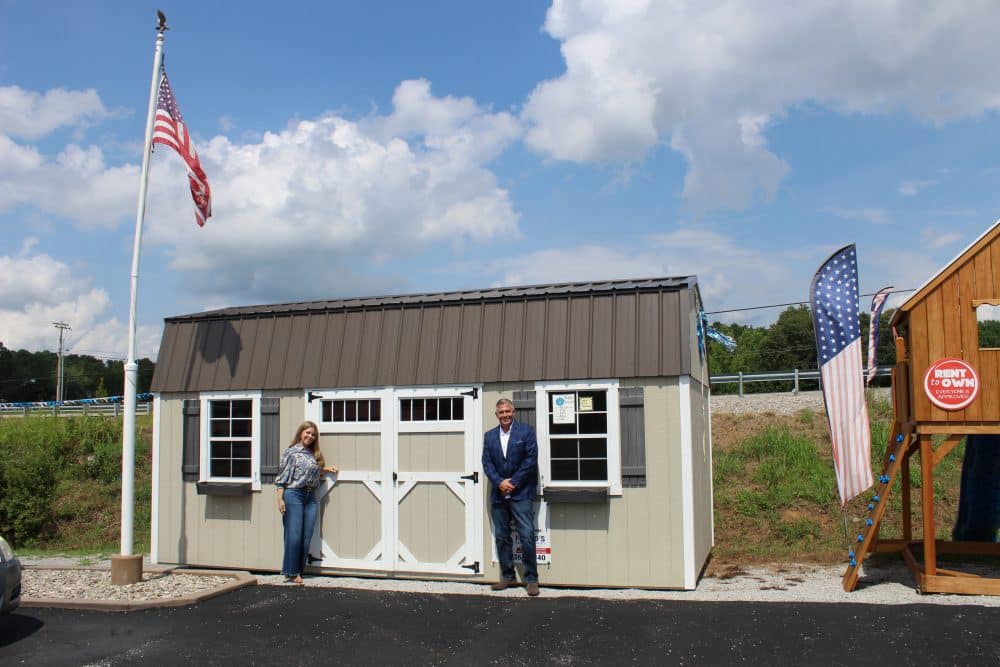
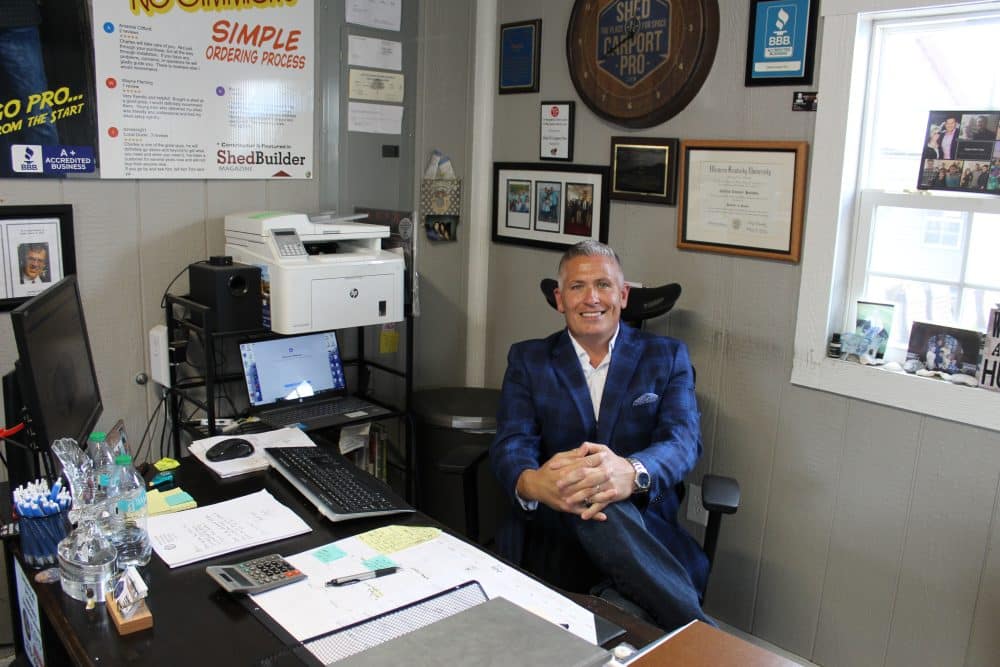
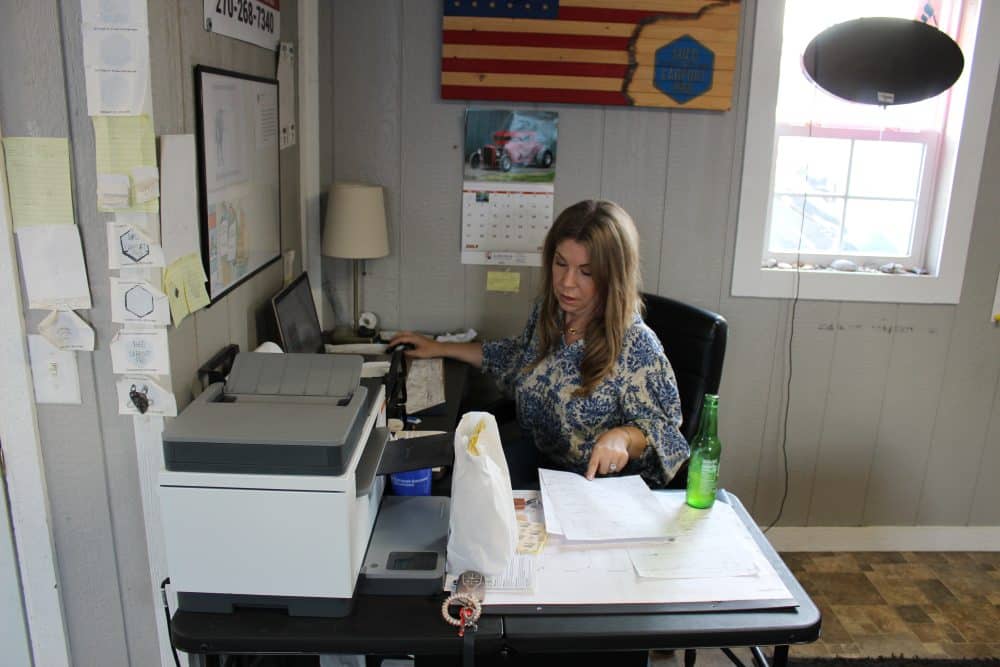
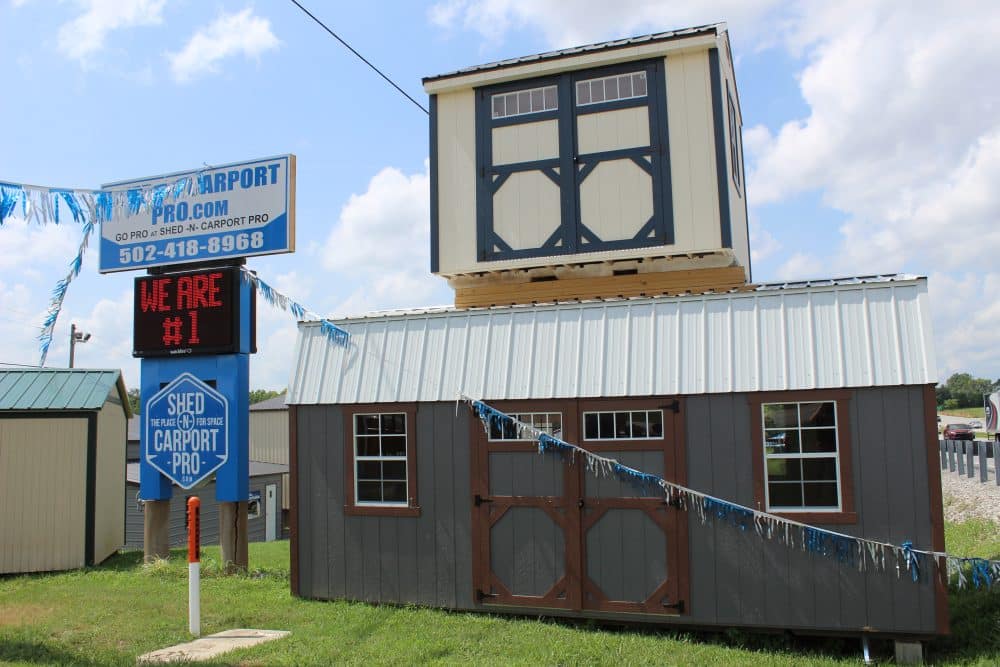
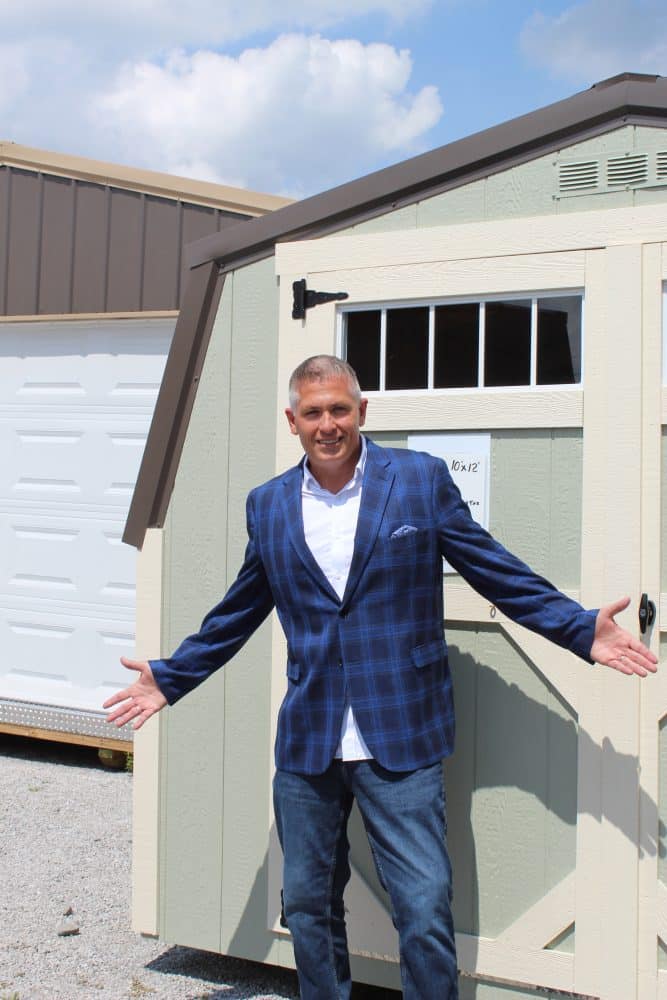
Charles Hutchins is probably a familiar name.
He’s a regular columnist in Shed Business Journal, and he owns and operates Shed-N-Carport Pro in Radcliff, Kentucky, with his wife, Deidra.
He’s also known as the Shed Coach, presenting “The Ten Core Commitments for Success in the Shed & Carport Industry” to other shed businesses and at the annual Shed Builder Expo.
While his name might be familiar, you might not know much about the man and his shed industry story. So, I met up with Charles (and Deidra) on his lot and found out more about who he is and how he operates.
Tell the story of how you got into the shed industry.
I officially got into the shed industry in December of ’95. I was on the phone with my dad one night while I was attending college at Western Kentucky University. We were just talking, and he knew I was entrepreneurial. He mentioned some people he worked with, family friends, bought a tractor-trailer load of insulated panels, and they were making sheds out of them. And they were selling like hotcakes. He goes, you need to find out a way to get involved in this, and I said okay.
I called the gentleman, and I said let’s talk about me selling sheds for you. He came down to Bowling Green, took me out to eat with his son, and I pitched it for him to supply me with sheds. People knew I was a hard worker because I was mowing yards and washing cars as a kid, but that doesn’t necessarily translate into being a good business owner and shed salesman.
They said yes. They believed in me, which was a big deal because I wasn’t even sure I believed in myself. So, I found a spot and called the owner a couple of times, and he laughed at me when I told him I wanted to put a shed business there. He said to call him back in two weeks if I was serious. I called him back in two weeks, and he said because you called me back, as long as you have insurance, I’ll rent you the lot.
And that’s how I got going 30 years ago. It’s been a fun journey, and I’ve had a lot of luck. Like this property (in Radcliff), we got in when the prices hadn’t gone through the roof, yet, pre-COVID, and it was a godsend. The good news is my wife and I just recently paid it off, in March. The whole piece of land. Done. We don’t owe a penny to anybody.
Who influenced/helped you along the way? How?
The gentleman I talked to you about supplying me with sheds, his name was Ed Able, and he was a retired district judge in Taylor County. He owned real estate, commercial real estate, and things like that. He was a very successful gentleman from my neck of the woods whom I always looked up to, and he helped and mentored me along the way.
How did you and Deidra meet, and what’s her role in the business?
Deidra and I met at a business launch through mutual friends. It was love at first sight, and she and I had so many things in common.
Her role, she oversees operations and ensures seamless execution of our initiatives and goals. She also sits on several boards and helps with advertising and marketing. Deidra and I enjoy working together because we complement each other’s strengths and maintain a collaborative team dynamic.
What makes us a great team is our ability to communicate openly, divide responsibilities effectively, and support each other’s growth. We love this industry and the people we get to work with. We both have a customer service mindset.
What brands of sheds are you selling today?
I have my own brand, which is Element Shield Insulated Buildings. Then my partners are Sunrise Barns, Bruce Yoder out of Willisburg, Kentucky, and then you have Roman Stoll from Rollin Mini Barns in Odon, Indiana. They’re both super good people.
Then I have my Eagle Carports and Garages. I’m actually the No. 1 dealer in the state of Kentucky. I love the recognition. When you have your own business, a lot of times you don’t really pay attention to how you’re doing compared to other people until they tell you.
We’re just very blessed. Humbled and blessed.
From your viewpoint, how have shed builders changed over the years?
There seems to be a lot more of them. I think now, compared to years ago, I think everybody builds a really good product. Different builders tweak things in different ways. They have different little things they do, but for the most part, everybody’s building quality stuff these days.
Back when I first started, I would look at some other things and some other builders, which there were very few of them back then, and I don’t think the quality was there like it is now. There’s a real focus on quality now, I think.
I get people every now and then, and I’ll be showing the building out there, and they go, that looks like the same stuff that I got from Lowe’s years ago. It just rotted out from the bottom really quick. I tell them it’s a whole different ball game, and then explain it to them. A lot of times people are like, okay, that makes sense. And I always remind them the folks I work with are Amish. They don’t want any mistakes. They want to bring you a quality product, and they don’t want any calls, but if something goes wrong, guess what, we’re going to fix it.
Speaking of the customers, how have they changed over the years of your career?
I’ll tell you what, they’ve become a lot more savvy about what they want in their backyard. Used to be they needed something to store stuff in. I sold out those insulated buildings when I started out, and a few people would come in and buy them for their kids to live in the backyard. They don’t want to be in the house, but they don’t want to leave the house, so they want to be in the backyard. I thought that was really cool back then, but they’re a lot more savvy, and they want to make a statement with a building. That’s the big difference between now versus 25-30 years ago.
Talk a little bit about the Shed Coach side of things. How did that come about? What is it, and what does that involve for you?
What the Shed Coach side is, it’s kind of developed into a business. I came up with these 10 Core Commitments that I have talked about over the years, and I apply them. When I came to the Shed Builder Expo and spoke, people started asking me if I would you come speak to their company about sales to share with them what I do. I’d be like sure, and the cool thing is we’ll pay you to do it.
I share a lot of things with people a lot of times, and I don’t charge anything for it. But if I’m going to be gone from this location, which is a major location. It’s my wife’s and my living, and if I leave here, you’re talking about sometimes in a day potentially missing several thousand dollars. So, I do have to charge a little something, but it’s fun because I actually like teaching, and also like learning. I always tell the folks there, listen, I’m learning from you, too. I’m just going to share with what I do, but you may have a better way of doing it, and I’d love to hear it. It’s been fun to do that.
I try to do seven to 10 of those events a year, mostly in January and February when it’s slower. It could easily turn into a full-time deal if I really wanted to do that all the time. My goal is to stay relevant in the industry, but I don’t really have a goal. We’ve talked about maybe sit down and make some goals about what do you want to see Shed Coach do. What are some different platforms you can share this on, things like that. So, we’re looking into that, but we’re not really. Our focus is the day-in and day-out sales at this location.
How important is community and education in the shed industry?
So important, because I feel like the shed industry is kind of fragmented, that folks like you, Shed Business Journal, are bringing it all together. You brought it to the point where it’s not as fragmented. It’s a really huge industry, and I don’t think people understand how huge it is.
It’s a continuous thing, and I don’t see an end in sight. I always talk about the golden age. I think that golden age is upon us. We’re going to be living it out for the next 20, 30 years in this industry.
You mentioned that you have your own brand of shed. Tell me a little bit about what that involves, how that operates?
I buy them wholesale from one of my vendors, and they’re the insulated steel panel sheds that I started out with. I always wanted to be able to sell those throughout my career, so I found a way. I found a guy who builds a really great building, and he’s allowed me to market them up here under my own brand.
How do you handle delivery? What’s your process?
We have independent drivers who I work with who are fully insured. On my end, the sales part, I try to talk about access to the property. I’m trying to figure this out for myself and the driver to make it easier for them.
I try to really talk to them about are you sure we have plenty of room? Do you have any gates? How big is your gate? I try to eliminate any surprises before the driver gets there. How unlevel is your property? It’s got a decline. I’ll tell them to pick up 25 4-inch thick blocks. I have very few problems with deliveries anymore. I never had many problems, but I’ve learned to ask a lot more questions.
When someone comes on your lot, what’s your sales process? How do you operate?
Normally, I’ll see them looking around, and I’ll walk out there and introduce myself. Most of the time, I’ll say, ‘Hey, I’m Charles, I’m here, I’m wandering around working. You need me, I’ll be here. Would you like a bottle of water?’ Sometimes they’ll say they’re just looking, if they need anything, they’ll let me know. That’s great. Everything is marked with prices. I make it easy and have brochures. I try to instill in their minds that they’re at a little different place. I explain the process. Information is in the building. Prices are in the building. If you want different colors at the same price, we’ll just order it for you. I’ll go get them water if they want one, and then a lot of times, I hand them the water, and I go to walk off, and they’re like, wait a minute, I got a question.
I keep it really, really simple, but I also want my customers to feel like they’re dealing with somebody who’s interested in what they want. I’m going to try to make some connections. A lot of times it’s just sitting down with people and talking and chatting a little bit and figuring it out. When they’re comfortable, if they like you better, they’re going to buy from you. To me, that’s something that’s lost on salespeople. They have to like you. Don’t be antagonistic.
When a customer orders a shed from you, what is the timeframe for delivery?
If it’s off the lot, I tell people about a week and a half. If it’s a new order, it’s usually three to four weeks. Lead times are really stable right now.
And if I had to do some arm-twisting, give them something because they’re moving from another town and they need it by a certain date, I’ll get on the phone and talk to my Amish guys, and they’re like we’ll get it done. Most of the time, they can work it in.
What’s your lot strategy?
My strategy is I keep prices on everything. I’ll go out and check things. I do it randomly during the week. I make sure there are brochures in my buildings. Sometimes the wind blows the price sign off. I’ll just go put another one on there. I try to do that several times a month, just randomly when I’m not busy here, I’ll walk out there and start looking at stuff.
Anything else you can think of that’s important about what you do and how you do it?
I’m a regimented person. I’ve kind of developed a system for myself and try to brand myself. I think that’s another thing that’s important, if you’re getting into this business or any business that sells, even if you work for another company, brand yourself. Be the shed guy. You have to differentiate yourself from everybody else out here doing the same thing. I’m going to solve your problem.

